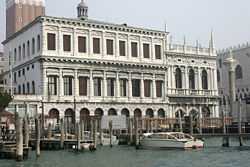Zecca of Venice

The Palazzo della Zecca is a 16th-century building in Venice which once housed the official government mint, or offices responsible for coining money. This building, rustic and robust in its external surface, stands in stark contrast to the ornately decorated Biblioteca Marciana next door. Both buildings were designed by Jacopo Sansovino. Today, the Zecca now serves as the host of the contents of the library of the Biblioteca Marciana.
The prior zecca had stood in the Rialto district since 1277[1] and moved here closer to the offices of the Republic located around the Piazza San Marco. This Zecca building was erected from 1537-1545, and built from solid blocks of Istrian marble. Since the mint formerly had ovens with high temperature and posed a risk of fire, little wood was used in construction. The entry archway with two Telamons was designed by Sansovino’s pupil, Vincenzo Scamozzi. The statues were carved by Girolamo Campagna and Tiziano Aspetti.[2] The courtyard has a statue of Apollo by Danese Cattaneo.
Venetian Coinage
The minting of ducats and coins ceased in 1870, when Venice joined the Kingdom of Italy. During the era of the Republic of Venice various coins were minted here, including:
| Name | Value | Minting | Name | |
|---|---|---|---|---|
| Ducato d'argento (Silver Ducat) | 1 grosso | 1202 (doge Enrico Dandolo) | also called Matapan | |
| Silver Soldo | 1328-1339 (doge Francesco Dandolo) | |||
| Silver Lira | 20 soldi | 6.52 g of silver con title of 948‰ | 1472 (doge Nicolò Tron) | also called Lira Tron, was the first lira of Italy: its name derives from Latin word libra |
| Silver Sequin | 12th century) | |||
| Golden Ducat or Golden Sequin | 1 fiorino | 1284 (doge Giovanni Dandolo) | From the duchy of Francesco Venier (1554 – 1559) it began to call itself zecchino (Sequin) . Minted in near pure gold (997‰). | |
Sources
- Translated from Italian Wikipedia entry.
- ↑ The Mint of Venice in the Middle Ages’’ By Alan M. Stahl, (2000), Johns Hopkins University Press
- ↑ Venice, (1891) by Augustus John Cuthbert Hare; page 20
Coordinates: 45°25′59″N 12°20′21″E / 45.43306°N 12.33917°E